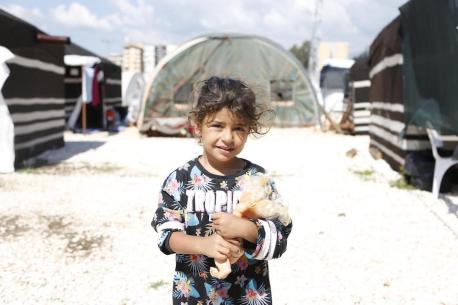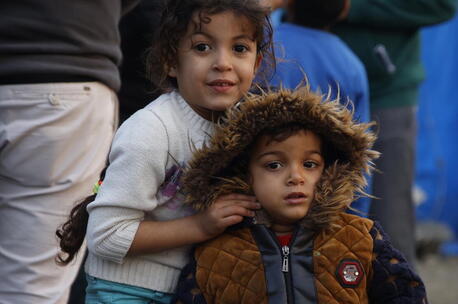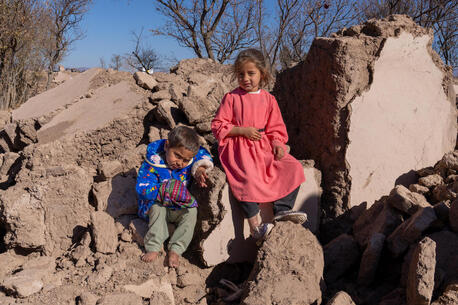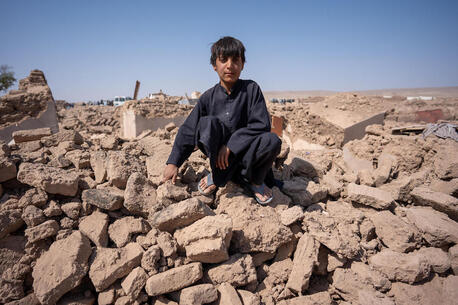
100 Days After Earthquakes, Millions of Children in Syria and Türkiye Still in Need
UNICEF has been working around the clock to provide emergency assistance for families after back-to-back earthquakes hit Türkiye and Syria in February. Much more remains to be done.
Millions remain displaced, struggling to rebuild their lives
One hundred days after Syria and Türkiye were hit by the deadliest earthquakes in recent history, millions of families are still struggling to rebuild their lives. Millions remain displaced; 2.5 million children in Türkiye and 3.7 million children in Syria are in need of continued humanitarian assistance.
“In the aftermath of the earthquakes, children in both countries have experienced unimaginable loss and grief,” said UNICEF Executive Director Catherine Russell, who visited both countries just weeks after the initial quakes. “The earthquakes struck areas where many families were already incredibly vulnerable. Children have lost family and loved ones, and seen their homes, schools and communities devastated and their entire lives turned upside-down.”

Children in Türkiye face rising poverty rates
Children in an estimated 40 percent of households were already living below the poverty line in parts of southeast Türkiye most affected by the quakes, compared to around 32 percent nationwide. Estimates show that without sustained local and international support, including cash transfers and access to education, this figure could soar above 50 percent.
Vulnerable children in hard-hit regions are exposed to threats including violence, forced marriage, child labor and dropping out of school. The earthquakes jeopardized the educations of nearly 4 million children enrolled in school in Türkiye, including 350,000 migrant and refugee children.

For Syria's children, a natural disaster on top of 12 years of armed conflict
In Syria, more than a decade of civil war has left infrastructure in ruins and severely impacted basic services. February's earthquakes further damaged schools, health facilities, and water and sewage infrastructure, putting 6.5 million people at elevated risk of waterborne diseases, including cholera.
An estimated 51,000 children under age 5 are likely to suffer from moderate and severe acute malnutrition, and 76,000 pregnant and breastfeeding women need treatment for acute malnutrition. An estimated 1.9 million children have had their educations disrupted by the earthquakes; many schools are being used as shelters.

UNICEF is working nonstop to meet the needs of children and families
Since the first earthquake hit in the early hours of Feb. 6, 2023, UNICEF and partners have been working tirelessly to meet families' most immediate needs, providing lifesaving assistance including safe water, hygiene kits and vaccines, along with psychosocial support and temporary learning centers. UNICEF teams are also supporting the rehabilitation of damaged infrastructure and restoration of basic services.
In Syria, UNICEF has:
- helped hundreds of thousands of people access safe water for drinking and domestic needs
- helped more than 140,000 children access formal or nonformal education, including early learning
- supported more than 260,000 children, adolescents and caregivers in accessing community-based mental health and psychosocial support

A top priority: helping families afford the basics
In Türkiye, UNICEF remains focused on providing lifesaving supplies to the 2.5 million children still in need of assistance. During the early recovery, UNICEF's work will include providing cash assistance to help families afford basic necessities, helping students get back to learning and continuing to provide psychosocial support to children and youth.
UNICEF is also providing financial assistance for the rebuilding of schools and supporting the Ministry of National Education with temporary education measures, including setting up tents for learning activities like catch-up classes and exam preparation, and establishing prefabricated classrooms.
The road to recovery is a long one, and families will require our continued support. — UNICEF Executive Director Catherine Russell
“The road to recovery is a long one, and families will require our continued support,” said Russell. “The long-term impacts of the disaster, including soaring food and energy prices combined with loss of livelihoods and access to services will push hundreds of thousands of children deeper into poverty. Unless financial assistance and essential services are prioritized for these children and families as part of the immediate and long-term recovery plan, then children will remain at greater risk of exploitation and abuse.”
HOW TO HELP
There are many ways to make a difference
War, famine, poverty, natural disasters — threats to the world's children keep coming. But UNICEF won't stop working to keep children healthy and safe.
UNICEF works in over 190 countries and territories — more places than any other children's organization. UNICEF has the world's largest humanitarian warehouse and, when disaster strikes, can get supplies almost anywhere within 72 hours. Constantly innovating, always advocating for a better world for children, UNICEF works to ensure that every child can grow up healthy, educated, protected and respected.
Would you like to help give all children the opportunity to reach their full potential? There are many ways to get involved.





